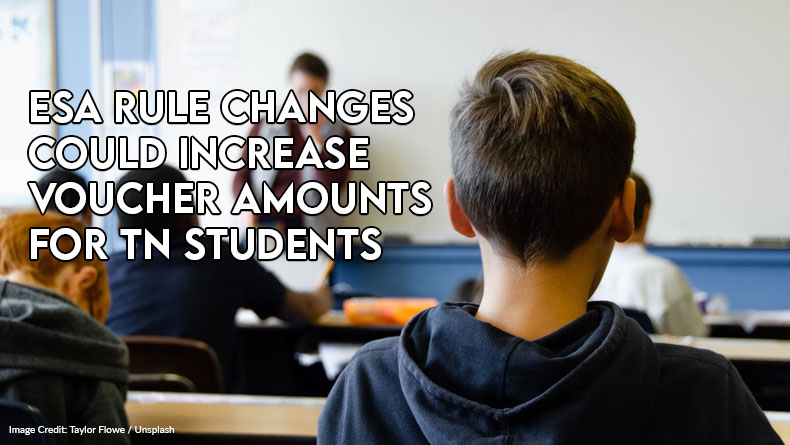Image Credit: Taylor Flowe / Unsplash
The Tennessee Conservative [By Jason Vaughn] –
As the state transitions from BEP funding to TISA, plans to potentially increase lawmakers’ investment in Education Savings Accounts (ESA) are being considered. A rulemaking hearing scheduled for January 30 could lead the Tennessee State Board of Education to as much as double what is currently available for the program.
Currently, students who receive funding from an ESA are given approximately $7500. To be eligible, those students must live in a family with a household income that is no more than twice what is allowed as the annual income to be eligible for the federal free lunch program.
The updated rules proposal that will be considered at the end of the month would potentially increase that amount.

Proposed rule 0520-01-16, Item 7 reads, “The maximum annual amount to which a participating student is entitled under the Program shall be equal to the amount representing the per-pupil state and local funds generated and required through the state’s K-12 education funding formula for the LEA in which the participating student resides, or the statewide per pupil average of required state and local funds as determined through the state’s K-12 education funding formula, whichever amount is less.”
Under the new TISA funding formula, the base funding rate is $6860 per student. Additional funding is provided for students who are economically disadvantaged, require special services to provide for learning, or live in rural or lower-income areas.
This means students could receive well above the current $7500 allotment if their LEA would have received a higher amount for that student.
The program is currently set up with a budget that could provide up to 5,000 students with funding through the ESA. According to the Tennessee Department of Education, as of November 29, there were a total of 1,046 applications for the program. 306 applications were approved for Memphis students and 209 were approved for Nashville-area students.

Critics have continued to claim that ESAs would only make public schools even worse because they would take funding away from schools that were already struggling. However, all funding that is given to students through an ESA is reimbursed to schools through a school improvement grant, which is also state-funded.
According to the Comptroller, “As the cap on ESA student enrollment rises in subsequent years (e.g., 7500 students in year two, 10,000 students in year three), the state will increase the amount budgeted to reimburse Metro Nashville and Shelby County to cover the additional students.”
In the fourth year of the ESA program, that reimbursement plan will be replaced with a state-awarded grant program that will give grants to all school districts in the state with priority schools. The amount of that funding will be determined in a later rules and administration meeting.


About the Author: Jason Vaughn, Media Coordinator for The Tennessee Conservative ~ Jason previously worked for a legacy publishing company based in Crossville, TN in a variety of roles through his career. Most recently, he served as Deputy Director for their flagship publication. Prior, he was a freelance journalist writing articles that appeared in the Herald Citizen, the Crossville Chronicle and The Oracle among others. He graduated from Tennessee Technological University with a Bachelor’s in English-Journalism, with minors in Broadcast Journalism and History. Contact Jason at news@TennesseeConservativeNews.com



One Response
I might better understand this article if I had a clue what BPA, TISA, ESA and LEA were and how these all impact school funding. If we as taxpayers believe we should fund the education of students between grades K-12, then let the money go to the individual student (voucher) to be spent at the school of their (parents) choice. The public schools would get better or close.